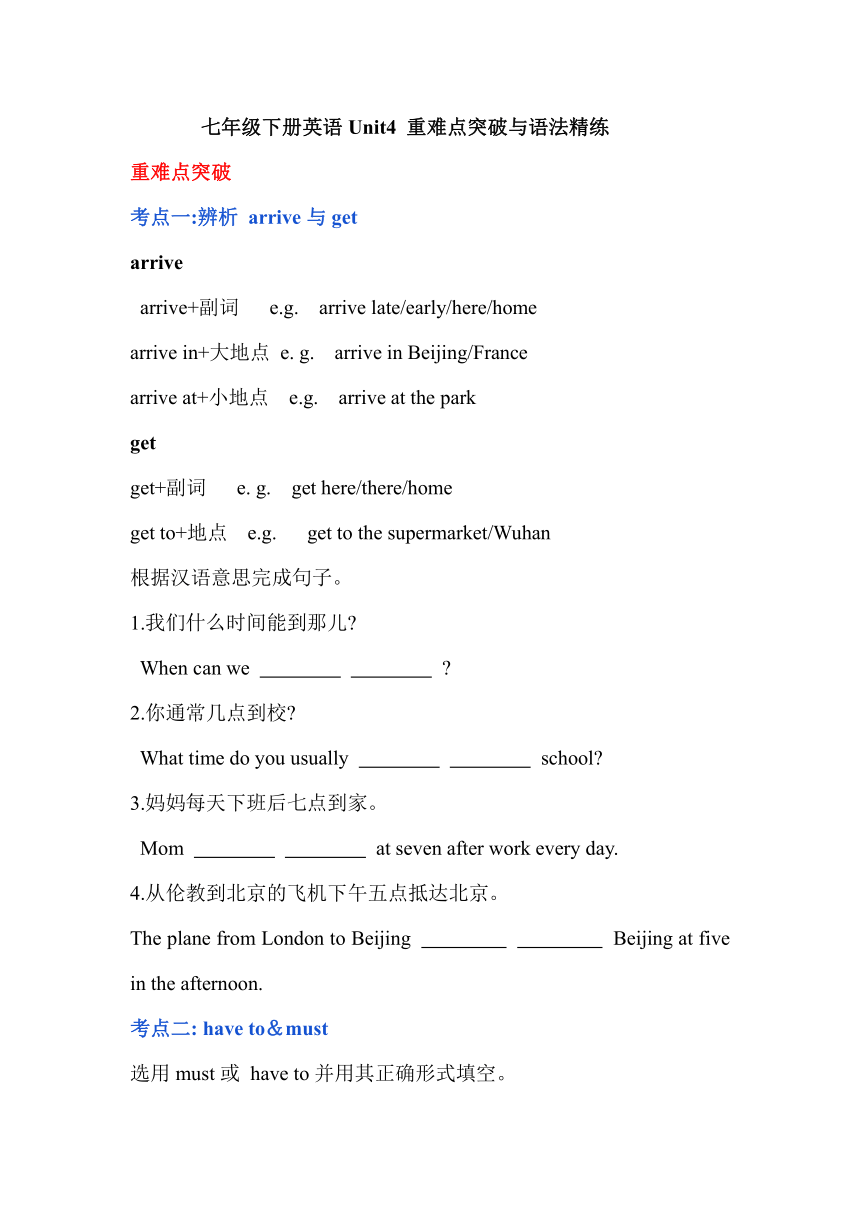
七年级下册英语Unit4 重难点突破与语法精练 重难点突破 考点一:辨析 arrive与get arrive arrive+副词 e.g. arrive late/early/here/home arrive in+大地点 e. g. arrive in Beijing/France arrive at+小地点 e.g. arrive at the park get get+副词 e. g. get here/there/home get to+地点 e.g. get to the supermarket/Wuhan 根据汉语意思完成句子。 1.我们什么时间能到那儿? When can we ? 2.你通常几点到校? What time do you usually school? 3.妈妈每天下班后七点到家。 Mom at seven after work every day. 4.从伦教到北京的飞机下午五点抵达北京。 The plane from London to Beijing Beijing at five in the afternoon. 考点二: have to&must 选用must或 have to并用其正确形式填空。 1.We are students and we work hard at our lesson. 2. My daughter is ill. I look after her at home. 3. - they finish the work today? -No, they . 4. It's raining, so he stay at home. 5. Students fight at school. 考点三:wear,put on& dress wear 及物动词,意为“穿着”,强调穿的状态,后跟衣物名词或代词作宾语 put on 动词短语,意为“穿上”,强调穿的动作,后跟衣物名词或代词作宾语 dress 作及物动词,意为“给......穿衣”,后跟表人的名词或代词、反身代词作宾语 作不及物动词,意为“穿(衣)”,常用表达 be/get dressed (in+衣物/颜色) c.作可数名词,意为“连衣裙”。 单项选择。 ( )1. Grandma her shoes and goes out. A. wears B. puts on C. dresses D. is dressed ( )2. The boy always his glasses. A. puts on B. is dressed in C. wears D. dresses him ( )3. My mother usually gets up and at six in the morning. A. puts on B. gets dressed C. dress her D. wear herself ( )4. It’s cold today. your warm coat. A. Be dressed B. Put on C. Wear D. Dress 考点四: too many,too much& much too 单项选择。 ( )1. He has questions to ask you. A. too many B. too much C. much too D. many too ( )2. Today we have work to do, so we'd better start early. A. very much B. too many C much too D. too much ( )3. The ice-cream is so delicious and I have . A. very much B. too many C. much too D. too much ( )4. I’m afraid that this T-shirt is big for me. A. so much B. too much C. much too D. very much 考点五: remember的用法 remember sth.记住记得某事 remember to do sth. 记住要做某事,强调该事还未做 remember doing sth. 记得做了某事,强调该事已做 remember+从句 记得...... 根据汉语意思完成句子。 1.我记得你的名字。你叫苏珊,对吧? I . You are Susan, right? 2.彼得,明天是星期一。记住要穿校服。 Tomorrow is Monday, Peter. your school uniform. 3我记得读过这本书。它非常有趣。 I this book. It's very interesting. 考点六: follow的用法 a .follow作动词,意为“遵循;跟随”,常见搭配: follow the rules遵守规则; follow sb to do sth.跟随某人做某事 b.following作形容词,意为“接着的:接下来的”。 e.g. the following story接下来的故事 根据汉语意思完成句子。 1.在学校里,学生必须遵守规则。 Students must at school. 2.简跟着我走进博物馆。 Jane into the museum. 3.你能告诉我接下来的事情吗? Can you tell me the things? 语法精练 I.用括号内所给单词的适当形式填空。 1. (be) quiet in the library. 2. (not run) in the busy street. 3. (remember) to bring your smartphone. 4. (do) your homework first. 5. Let's (play) so ... ...
~~ 您好,已阅读到文档的结尾了 ~~